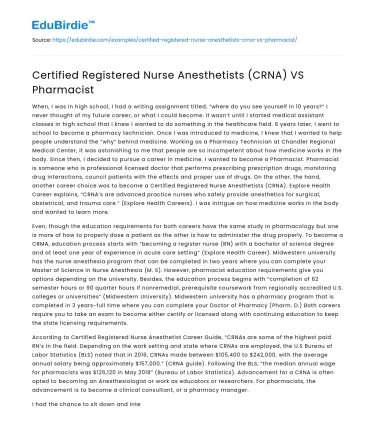When, I was in high school, I had a writing assignment titled, “where do you see yourself in 10 years?” I never thought of my future career, or what I could become. It wasn’t until I started medical assistant classes in high school that I knew I wanted to do something in the healthcare field. 6 years later, I went to school to become a pharmacy technician. Once I was introduced to medicine, I knew that I wanted to help people understand the “why” behind medicine. Working as a Pharmacy Technician at Chandler Regional Medical Center, it was astonishing to me that people are so incompetent about how medicine works in the body. Since then, I decided to pursue a career in medicine. I wanted to become a Pharmacist. Pharmacist is someone who is professional licensed doctor that performs prescribing prescription drugs, monitoring drug interactions, council patients with the effects and proper use of drugs. On the other, the hand, another career choice was to become a Certified Registered Nurse Anesthetists (CRNA). Explore Health Career explains, “CRNA’s are advanced practice nurses who safely provide anesthetics for surgical, obstetrical, and trauma care.” (Explore Health Careers). I was intrigue on how medicine works in the body and wanted to learn more.
Even, though the education requirements for both careers have the same study in pharmacology but one is more of how to properly dose a patient as the other is how to administer the drug properly. To become a CRMA, education process starts with “becoming a register nurse (RN) with a bachelor of science degree and at least one year of experience in acute care setting” (Explore Health Career). Midwestern university has the nurse anesthesia program that can be completed in two years where you can complete your Master of Science in Nurse Anesthesia (M. S). However, pharmacist education requirements give you options depending on the university. Besides, the education process begins with “completion of 62 semester hours or 90 quarter hours if nonremedial, prerequisite coursework from regionally accredited U.S. colleges or universities” (Midwestern University). Midwestern university has a pharmacy program that is completed in 3 years-full time where you can complete your Doctor of Pharmacy (Pharm. D.) Both careers require you to take an exam to become either certify or licensed along with continuing education to keep the state licensing requirements.
Save your time!
We can take care of your essay
- Proper editing and formatting
- Free revision, title page, and bibliography
- Flexible prices and money-back guarantee
According to Certified Registered Nurse Anesthetist Career Guide, “CRNAs are some of the highest paid RN’s in the field. Depending on the work setting and state where CRNAs are employed, the U.S Bureau of Labor Statistics (BLS) noted that in 2016, CRNAs made between $105,400 to $242,000, with the average annual salary being approximately $157,000.” (CRNA guide). Following the BLS, “the median annual wage for pharmacists was $126,120 in May 2018” (Bureau of Labor Statistics). Advancement for a CRNA is often opted to becoming an Anesthesiologist or work as educators or researchers. For pharmacists, the advancement is to become a clinical consultant, or a pharmacy manager.
I had the chance to sit down and interview two candidates in my future career choices Kelly Olsen, CRNA at Mercy Gilbert Medical Center and Bumjum Oh, Pharmacist at Chandler Regional Medical Center. I asked questions about the lifestyle in their careers and what’s it like to be in their shoes. Kelly explains “that the job comes with many responsibility and tremendous amount of accountability. Being a CRNA can be very demanding, but that’s why we go to school and working in the ICU areas to gain the knowledge and experience into becoming a great CRNA”. (Olsen) Bumjum explains “for the most part, luckily work is flexible to adapt to life, being a pharmacist has its demands now and then like dealing with chemotherapy drugs, baby dosage, or critical patients in general. Giving medicine knowledge helps other understand how medicine works in the body, and which what we do as pharmacists. Being a pharmacist is a great career choice because we are like the “dictionary” for medicine in the healthcare world.” (Oh)
Lastly, the best career choice for me is to become a Pharmacist. I enjoy teaching, learning, and understanding the whole “why” behind how things work in the body. I believe this career choice will give me the challenge that I’ve been striving for and will keep me wanting to continue my education further.






 Stuck on your essay?
Stuck on your essay?

